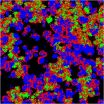(Press-News.org) Receptors for the messenger molecule serotonin can be modified in such a way that they can be activated by light. Together with colleagues, neuroscientists from the Ruhr-Universität Bochum (RUB) report on this finding in the journal "Neuron". An imbalance in serotonin levels seems to cause anxiety and depression. The researchers have provided a new model system for investigating the mechanism underlying these dysfunctions in cell cultures as well as living organisms.
G protein coupled receptors play an important role in medicine and health
One receptor, which is important for the regulation of serotonin levels in the brain, is the 5-HT1A receptor. It belongs to a protein family called G protein coupled receptors (GPCRs). These receptors can activate different signalling pathways in cells to support or suppress various signalling events. "About 30 per cent of the current drugs target specifically GPCRs", says Prof Dr Stefan Herlitze from the Department of General Zoology and Neurobiology at the RUB. Due to the lack of tools to control intracellular signalling pathways with high temporal and spatial accuracy, it was so far difficult to analyse these pathways precisely.
Coupling of visual pigments to serotonin receptors
Applying optogenetic methods the scientists in Bochum used cone opsins from the mouse and human eye to control specifically serotonin signalling pathways either with blue or red light. Prof Dr Stefan Herlitze has been working with optogenetic techniques since 2005 and is one of the pioneers in the field. The light-activated serotonin receptors can be switched on within milliseconds, are extremely light sensitive in comparison to other optogenetic tools and can be repetitively activated. "We hope that with the help of these optogenetic tools, we will be able to gain a better understanding about how anxiety and depression originate", states RUB neuroscientist Dr Olivia Masseck.
Successful behavioural tests
The scientists also demonstrated that they were able to modulate mouse emotional behaviour using the light-activated receptors. When they switched on the serotonergic signals by light in a certain brain area, the mice became less anxious.
INFORMATION:
Bibliographic record
O.A. Masseck, K. Spoida, D. Dalkara, T. Maejima, J.M. Rubelwoski, L. Wallhorn,
E.S. Deneris, S. Herlitze (2014): Vertebrate cone opsins enable sustained and highly
sensitive rapid control of Gi/o signaling in anxiety circuitry. Neuron, DOI:
10.1016/j.neuron.2014.01.041
Further Information
Dr Olivia Masseck, Department of General Zoology and Neurobiology, Faculty of Biology and Biotechnology at the Ruhr-Universität, 44780 Bochum, Germany, phone: +49/234/32-
27246, email: masseck@neurobiologie.rub.de
Click for more
Video: Summary of the article
Editor: Dr Julia Weiler
Switching off anxiety with light
RUB scientists couple cone opsins with serotonin receptors
2014-04-07
ELSE PRESS RELEASES FROM THIS DATE:
The tiniest greenhouse gas emitters
2014-04-07
Climate feedbacks from decomposition by soil microbes are one of the biggest uncertainties facing climate modelers. A new study from the International Institute for Applied Systems Analysis (IIASA) and the University of Vienna shows that these feedbacks may be less dire than previously thought.
The dynamics among soil microbes allow them to work more efficiently and flexibly as they break down organic matter – spewing less carbon dioxide into the atmosphere than previously thought, according to a new study published in the journal Ecology Letters.
"Previous climate ...
Exploring the genetics of 'I'll do it tomorrow'
2014-04-07
Procrastination and impulsivity are genetically linked, suggesting that the two traits stem from similar evolutionary origins, according to research published in Psychological Science, a journal of the Association for Psychological Science. The research indicates that the traits are related to our ability to successfully pursue and juggle goals.
"Everyone procrastinates at least sometimes, but we wanted to explore why some people procrastinate more than others and why procrastinators seem more likely to make rash actions and act without thinking," explains psychological ...
Green tea boosts your brain
2014-04-07
Green tea is said to have many putative positive effects on health. Now, researchers at the University of Basel are reporting first evidence that green tea extract enhances the cognitive functions, in particular the working memory. The Swiss findings suggest promising clinical implications for the treatment of cognitive impairments in psychiatric disorders such as dementia. The academic journal Psychopharmacology has published their results.
In the past the main ingredients of green tea have been thoroughly studied in cancer research. Recently, scientists have also been ...
New method for prostate cancer detection can save millions of men painful examination
2014-04-07
Each year prostate tissue samples are taken from over a million men around the world – in most cases using 12 large biopsy needles – to check whether they have prostate cancer. This medical procedure, which was recently described by an American urology professor as 'barbaric'**, shows that 70% of the subjects do not have cancer. The examination is unnecessarily painful and involves risk for these patients, and it is also costly to carry out. A patient-friendly examination, which drastically reduces the need for biopsies, and may even eliminate them altogether, has been ...
Rilpivirine combination product in pretreated HIV-1 patients: added benefit not proven
2014-04-07
The German Institute for Quality and Efficiency in Health Care (IQWiG) reassessed the antiviral drug combination rilpivirine/emtricitabine/tenofovir. In early 2012, the combination was approved for the treatment of adults infected with human immunodeficiency virus type 1 (HIV-1) who have not received previous antiretroviral treatment. For men, the Institute then found proof, and for women, indications of a considerable added benefit of the fixed combination in comparison with the appropriate comparator therapy.
In the end of 2013, the approval was expanded to people ...
Tropical Cyclone Peipah passes Palau, Philippines prepare
2014-04-07
Tropical Cyclone Peipah passed the island of Palau on April 5 moving through the Northwestern Pacific Ocean as it heads for a landfall in the Philippines. Peipah was formerly known as Tropical Cyclone 05W and was renamed when it reached tropical storm-force. Since then, however, wind shear has weakened the storm to a tropical depression.
On April 5 at 2100 UTC/5 p.m. EDT, Tropical Storm 05W, renamed Peipah (and known locally in the Philippines as Domeng) was located about 262 nautical miles east-southeast of Koror. It was centered near 5.5 north and 137.8 east and moving ...
Cleft palate discovery in dogs to aid in understanding human birth defect
2014-04-07
UC Davis School of Veterinary Medicine researchers have identified the genetic mutation responsible for a form of cleft palate in the dog breed Nova Scotia Duck Tolling Retrievers.
They hope that the discovery, which provides the first dog model for the craniofacial defect, will lead to a better understanding of cleft palate in humans. Although cleft palate is one of the most common birth defects in children, affecting approximately one in 1,500 live human births in the United States, it is not completely understood.
The findings appear this week online in the journal ...
Remedial courses fail bachelor's degree seekers, but boost those in associate's programs
2014-04-07
CHESTNUT HILL, MA (April 7, 2014) – Taking remedial courses at the four-year college level may hold students back from earning their bachelor's degrees, but at the community college level remedial education can help earn an associate's degree, according to researchers from Boston College's Lynch School of Education.
The role of remedial education has been under scrutiny for years, viewed as an essential tool in efforts to raise rates of degree completion. At the same time, critics question whether the courses are appropriate for institutions of higher education.
The ...
Movies synchronize brains
2014-04-07
When we watch a movie, our brains react to it immediately in a way similar to brains of other people. Researchers at Aalto University in Finland have succeeded in developing a method fast enough to observe immediate changes in the function of the brain even when watching a movie.
By employing movies it was possible to investigate the function of the human brain in experimental conditions that are close to natural. Traditionally, in neuroscience research, simple stimuli, such as checkerboard patterns or single images, have been used.
Viewing a movie creates multilevel ...
Caffeine against Alzheimer's disease
2014-04-07
As part of a German-French research project, a team led by Dr. Christa E. Müller from the University of Bonn and Dr. David Blum from the University of Lille was able to demonstrate for the first time that caffeine has a positive effect on tau deposits in Alzheimer's disease. The two-years project was supported with 30,000 Euro from the non-profit Alzheimer Forschung Initiative e.V. (AFI) and with 50,000 Euro from the French Partner organization LECMA. The initial results were published in the online edition of the journal "Neurobiology of Aging."
Tau deposits, along ...
LAST 30 PRESS RELEASES:
The hidden breath of cities: Why we need to look closer at public fountains
Rewetting peatlands could unlock more effective carbon removal using biochar
Microplastics discovered in prostate tumors
ACES marks 150 years of the Morrow Plots, our nation's oldest research field
Physicists open door to future, hyper-efficient ‘orbitronic’ devices
$80 million supports research into exceptional longevity
Why the planet doesn’t dry out together: scientists solve a global climate puzzle
Global greening: The Earth’s green wave is shifting
You don't need to be very altruistic to stop an epidemic
Signs on Stone Age objects: Precursor to written language dates back 40,000 years
MIT study reveals climatic fingerprints of wildfires and volcanic eruptions
A shift from the sandlot to the travel team for youth sports
Hair-width LEDs could replace lasers
The hidden infections that refuse to go away: how household practices can stop deadly diseases
Ochsner MD Anderson uses groundbreaking TIL therapy to treat advanced melanoma in adults
A heatshield for ‘never-wet’ surfaces: Rice engineering team repels even near-boiling water with low-cost, scalable coating
Skills from being a birder may change—and benefit—your brain
Waterloo researchers turning plastic waste into vinegar
Measuring the expansion of the universe with cosmic fireworks
How horses whinny: Whistling while singing
US newborn hepatitis B virus vaccination rates
When influencers raise a glass, young viewers want to join them
Exposure to alcohol-related social media content and desire to drink among young adults
Access to dialysis facilities in socioeconomically advantaged and disadvantaged communities
Dietary patterns and indicators of cognitive function
New study shows dry powder inhalers can improve patient outcomes and lower environmental impact
Plant hormone therapy could improve global food security
A new Johns Hopkins Medicine study finds sex and menopause-based differences in presentation of early Lyme disease
Students run ‘bee hotels’ across Canada - DNA reveals who’s checking in
SwRI grows capacity to support manufacture of antidotes to combat nerve agent, pesticide exposure in the U.S.
[Press-News.org] Switching off anxiety with lightRUB scientists couple cone opsins with serotonin receptors




